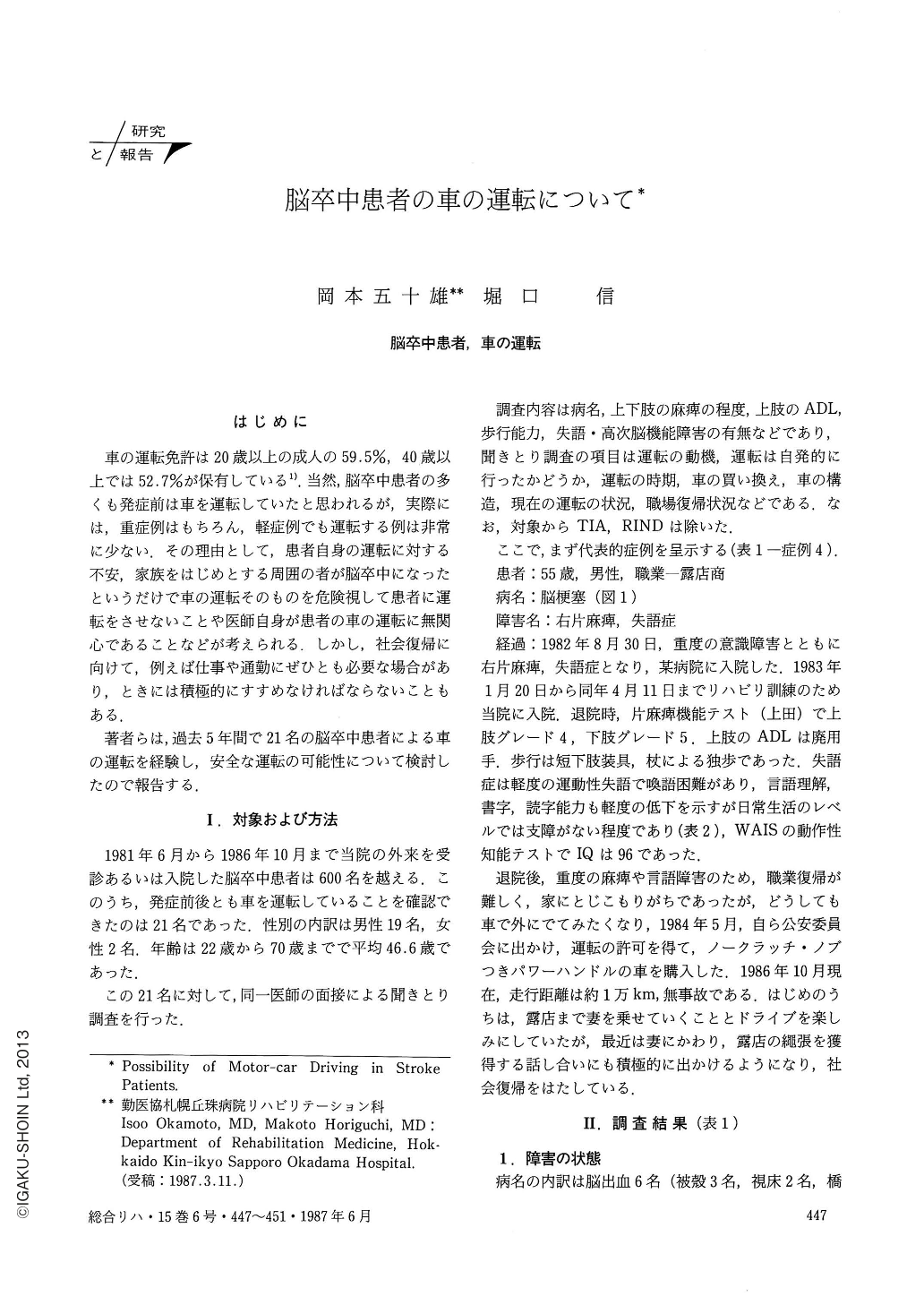26 0 0 0 OA 脳卒中患者のこころのうち ―障害受容とこころの推移
- 著者
- 岡本 五十雄
- 出版者
- 公益社団法人 日本リハビリテーション医学会
- 雑誌
- The Japanese Journal of Rehabilitation Medicine (ISSN:18813526)
- 巻号頁・発行日
- vol.57, no.10, pp.904-912, 2020-10-16 (Released:2020-12-05)
- 参考文献数
- 21
- 被引用文献数
- 2 2
「現在の障害のある状態,これが自分なのだ」と認められる(受容する)ようになるまでに,一定の経過をたどるが,すべての患者が同じ経過をたどるわけではない.また,聞くまでわからないことが多い.中にはまったく,苦悩を経験しない患者もいる.経済的に安定した豊かな人生は,障害受容の大きな要因であるが,苦悩を抱えている患者も多い.患者の人生との対話という視点はきわめて重要である.回復期リハビリテーション病棟の多くの患者は入院中に受容し,心理症状も抑うつ傾向も改善する.患者の話をよく聞き,ともに歩むチームの真摯な努力こそが患者が自らを受け入れ(受容し),障害とともに歩み,社会に適応していくうえでの大きな力となる.
8 0 0 0 OA 障害受容(克服)—脳卒中患者のこころのうち—
- 著者
- 岡本 五十雄
- 出版者
- 公益社団法人 日本リハビリテーション医学会
- 雑誌
- The Japanese Journal of Rehabilitation Medicine (ISSN:18813526)
- 巻号頁・発行日
- vol.50, no.12, pp.951-956, 2013 (Released:2014-02-04)
- 参考文献数
- 17
- 被引用文献数
- 1
Until the time arrives when stroke patients truly recognize themselves as handicapped (living with their disabilities), it is well known that they usually pass through the five stages of grief, namely : denial, anger, bargaining, depression and acceptance. It is difficult to know which stage a patient is at, but we have found that a patient's writing, their letters, the occasional poem, etc are all of great use to identify the stage. Patients who are satisfied with their present lives are more able to accept their situation and therefore have fewer tendencies toward suicidal thoughts. The richness of their lives helps them to overcome their disabilities and enables them to return back to society. We should not force our patients, especially those in the denial or confusion stage, to accept their disabilities and rather must try to listen sincerely about their suffering and their stories. Most patients with brain strokes are encouraged to do their best “ganbare" by medical staff such as nurses, physical therapists, occupational therapists, speech language hearing therapists and doctors, and their family members and their friends. Usually, they are pleased to hear these words. However, some patients may perceive such encouragement as stressful, but if we know how to use these words in a supportive, positive manner, then they can be useful words in the care of stroke patients.
2 0 0 0 OA 脳卒中患者の障害受容(克服)と希死念慮
- 著者
- 岡本 五十雄
- 出版者
- The Japanese Association of Rehabilitation Medicine
- 雑誌
- リハビリテーション医学 (ISSN:0034351X)
- 巻号頁・発行日
- vol.40, no.8, pp.531-536, 2003-08-18 (Released:2009-10-28)
- 参考文献数
- 13
1 0 0 0 脳卒中患者の車の運転について
はじめに 車の運転免許は20歳以上の成人の59.5%,40歳以上では52.7%が保有している1).当然,脳卒中患者の多くも発症前は車を運転していたと思われるが,実際には,重症例はもちろん,軽症例でも運転する例は非常に少ない.その理由として,患者自身の運転に対する不安,家族をはじめとする周囲の者が脳卒中になったというだけで車の運転そのものを危険視して患者に運転をさせないことや医師自身が患者の車の運転に無関心であることなどが考えられる.しかし,社会復帰に向けて,例えば仕事や通勤にぜひとも必要な場合があり,ときには積極的にすすめなければならないこともある. 著者らは,過去5年間で21名の脳卒中患者による車の運転を経験し,安全な運転の可能性について検討したので報告する.

